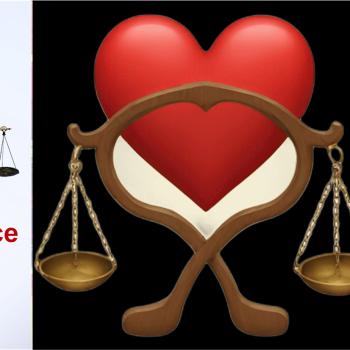Most of the arguments, such as they are, are invective, and political invective at that.
For his part, when Mark Tooley argued in The American Spectator last week that the What Would Jesus Cut? movement is wrong, he too simply attacked the people behind it or reminded his readers of their own common passions for national defense and hatred for "the huge entitlement welfare state [that] is the Religious Left's primary cherished temple."
Again, Tooley, who is a Christian intellectual, offers no engagement with the theology informing Wallis, McLaren, et. al., only a conservative species of ad hominem attacks (Brian McLaren is a liberal; Jim Wallis is a pacifist) and straw man arguments. This Christian on the so-called "religious left" has one "temple": my love of God. I have no desire for an entitlement state; what I seek is justice, because God tells us to pursue it.
I support government programs that might draw us closer to that goal. If I thought church bake sales or operating a soup kitchen out of my kitchen window were the best remedies, I'd support them instead.
When Speaker of the House John Boehner spoke on the budget February 27 in front of the National Religious Broadcasters, he used the word "moral" over a dozen times and spoke passionately about America's children, so I thought maybe here at last we'd find some pertinent theology. Boehner didn't mention education cuts, substandard medical care, or any other pressing issue facing American children except for one: the national deficit.
We are now at risk of losing a much more potent source of capital. That is the moral capital we gain from having a society that honors freedom and opportunity, and protects these values for our children and grandchildren.
Consider that a child born on this night will immediately inherit a $45,000 share of our national debt. By the time that newborn is getting ready to visit colleges, Medicare, Medicaid, Social Security, and the interest on our debt will consume all government revenues.
Here we must speak the truth. Yes, this level of debt is unsustainable. It is also immoral.
Yes, this debt is a mortal threat to our country. It is also a moral threat.
It is immoral to bind our children to as leeching and destructive a force as debt. It is immoral to rob our children's future and make them beholden to China.
No society is worthy that treats its children so shabbily.
"A good man leaves an inheritance for his children's children," Proverbs reminds us. For too long, Washington has been ignoring this time-honored principle.
Can we tease a theological argument out of all this talk of morality? Can we hear the voice of Jesus speaking somewhere in these moral concerns about the budget?
A good man leaves an inheritance for his children's children.
No. With all respect to Proverbs (which is just that, a collection of wisdom sayings that may or may not apply to all of us in a given situation), the narrative of the entire Bible informs us that a good man is a just man who makes it possible for all children to survive and thrive.
We gain moral capital from having a society that honors freedom and opportunity.
No. Amos, Jeremiah, and Jesus tell us that we gain moral capital from doing what is right. A society where people have the opportunity to get rich can (and often does) dishonor God (see Jeremiah 7, among many other passages). As we've discussed for the past month, freedom and opportunity, wonderful as they are, are largely secular goods, and thus secondary to compassion and responsibility. Making freedom, acquisition, and security our highest goods diminishes our ability to respond faithfully to the needs of the world. The freedom to make and keep money is not Jesus-y.
So what about the big argument? Do we derive moral capital from balancing our budget and rescuing our children from debt?
Forgive me if I disagree with the Speaker of the House and our friends having Tea Parties: the deficit is not the most important moral issue being discussed in Washington and the state capitals. Nobel Prize Laureate Paul Krugman has been saying for some time that the deficit is less important than using public funding to provide jobs and help our citizens take care of themselves and their families so that we can fully emerge from the recession. Mr. Krugman says that he and many other economists are not worried, and that this deficit fetish is an issue turned into a partisan political ultimatum. Until there's a consensus among economists, I'm not going to worry about the deficit.
Now, those that do worry about children generations from now show a praiseworthy inclination toward compassion. But to allow children today to wallow in poverty, die of preventable diseases, and suffer substandard educations seems, somehow, less praiseworthy.
What would Jesus cut?
I think I know. But what do you think?
I pray for our leaders and legislators, I pray that we might have the wisdom to discern God's will in all things, and I ask God's blessings on all of us until we meet again.





